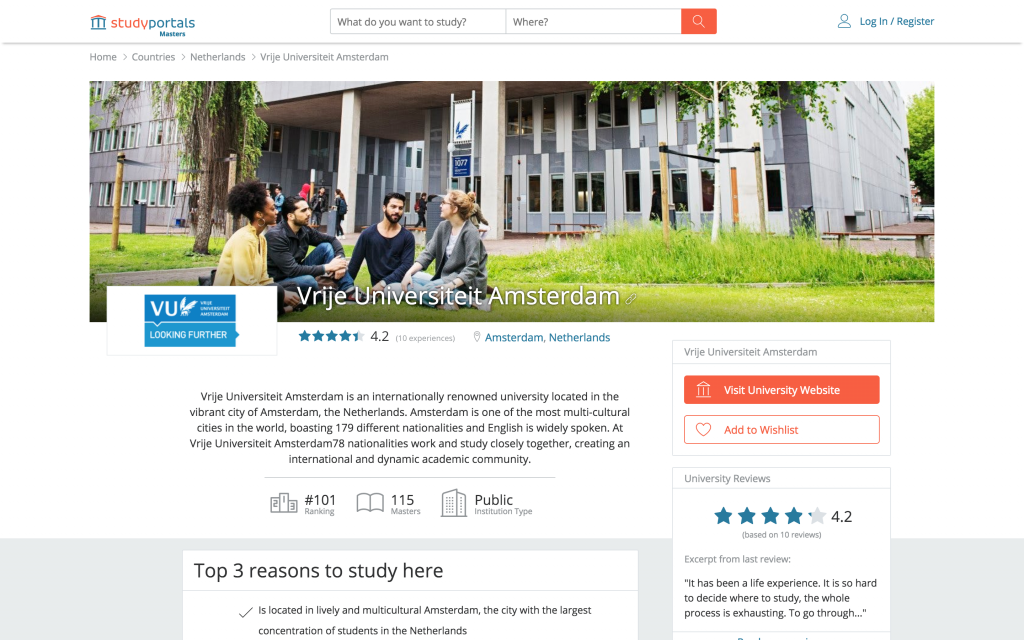How to leverage the power of student reviews for your university’s brand
It’s very likely that you’ve been in this scenario: Looking for a product to buy online and not knowing which one to choose from. You’ve found a couple that seem to be matching your needs, but you just cannot make up your mind about which one you should order because you’ve never had experience with neither of them. Simply put, you don’t know which one is better.
Maybe you don’t even know where to start with your search, so you open a new tab and type: “Best [insert product name] for 2022”, hit the search button and start reading through the results. Most likely, you will also check out the reviews for those particular products. Those opinions that you’re browsing through have a powerful influence on what you will ultimately purchase. If a product has accurate, positive reviews, you are more likely to consider buying it.
The impact of reviews is not limited to online shopping. Whenever we are faced with an important decision, we naturally look for clues about which path to take. We value the opinion of friends and family, and increasingly seek the recommendations from those who have been in our shoes before. BrightLocals’ recent research states that 85% of consumers trust online reviews as much as personal recommendations. With that much power over our decision-making outcomes, it’s important to pay closer attention to what reviews can do in 2023.
Take, for example, students. Study choice feels a lot like a combination of above scenarios. After all, most of them do their research predominantly online. In our conversations with students about how they take that life-changing decision of studying abroad, they share that comparing programmes is an overwhelming process. One of the criteria that they mentioned as helpful is knowing how other students experienced studying at a specific university and/or programme. Those reviews would help them make a better-informed choice based that fits their personal needs.
Your university can benefit a lot from having reviews written by alumni and current students about your institution and educational programmes.
The psychology of choice
Let’s look at why reviews are so powerful. During the decision-making process, we might suffer from what is known as choice paradox. Psychologist Barry Schwartz explains that we want to be able to make the best choice and for that, we inform ourselves about all available options. Yet when presented with too many of them, we tend to struggle with reaching a decision that we ultimately feel good about. American researcher Sheena Iyengar, who studies how we make decisions, shares that “The value of choice depends on our ability to perceive differences between the options” because “In reality, many choices are between things that are not that much different.”
What happens when multiple options are appealing to us, but no particular one truly stands out? We need to start shortlisting and eliminating options. To do that, oftentimes we turn to others for advice – someone who can hopefully clear out our uncertainty by bringing in valuable information. Most times, we want that someone to positively reinforce our gut-felt choice. That’s just how our brains work!
Even when we insist on choosing independently and revel in a sea of options, we still rather ask for and receive some guidance from our peers. This phenomenon is called social proof.
Social proof and peer reviews
The concept of social proof explains our tendency to rely on other people’s actions and knowledge to determine the right kind of behaviour in a given situation.
Reviews are one of the most powerful forms of online social proof. As part of the internet’s democratization effect, they empower us as users to share our very unique experience with a brand or a product. This behaviour is nurtured by our natural craving for personal, realistic, and self-affirming experiences.
Reviews make the discovery and shortlisting part of the decision-making process easy and quick. When they take the form of honest stories from engaged users, reviews contribute with reasonable and reliable details. A lot of times, reviews contain valuable information pieces that we cannot otherwise find. Given that many brands have similar offers in order to stay competitive, no matter how unique or different they position themselves, we look for something personal that will resonate with our own needs and identity, which will ultimately determine our choice.
Reviews also make decision-making more comfortable because they establish trust. Coming back to the research from Brightlocal, it states that people read an average of 7 reviews before trusting a business. Another interesting fact is that 49% of consumers need at least a four-star rating before they choose to use a business.
For example, big marketplaces such as Amazon and Airbnb are using reviews and ratings as trust builders and brand enhancers. Positive reviews cushion the idea of risk-taking and introduce a comforting feeling about the brand you’ve never tried. In the case of Airbnb, the reviews left for a host act as a quality validator. If 78 people stayed with a host and though he was welcoming, you will be more inclined to choose that particular host. If an Airbnb experience has lower ratings, you’d like to know the details before you choose an alternative.
Students act the same way. They like to know what’s it like to study at your institution. If a current student is satisfied with their university and can point out the specific reasons that make them feel happy, then sharing that experience with other students could inspire them and ignite the right kind of motivation.
How reviews can help universities
There are multiple benefits regarding reviews, for both students and higher education institutions. Many of them touch on the emotional side of how humans work, aiding the building of an institution’s credibility.
Our own research team, here at Studyportals, conducted a number of studies on the process of finding Bachelor’s and Master’s studies. In one of them, our team asked a number of students who were using our websites about the role of shared peer experiences in their decision-making. 77% of students found programme and university reviews from alumni and current students as important or very important. In their comments, students expressed that they valued a well-rounded, personal, realistic and student-centric description of the experience of studying abroad. One of them said:
“Reviews were one of the most important factors for my final decision.”
Hence why reviews act as a catalyst for a university’s brand enhancement. By adding reviews to your programmes and to the institution itself, you will benefit from the following brand boosters:
#1 Authenticity – One of the basic principles of a well-executed brand strategy is achieving the reciprocity between the image that you build of your institution and how your users actually perceive you. Reviews are a great way to validate your university’s brand promises towards students.
A research by Bazaarvoice, quoted in Forbes, states that “consumers have lost interest in the idealised ad campaigns that brands have created for their products. Instead, they want to know about the actual user experience which reviews provide”.
The not-so-positive reviews will eventually also appear, but you shouldn’t fear them. Negative reviews will still represent someone’s genuine, helpful and well-intended feedback. As such, they will build a realistic – not impeccable – image of your university’s brand, bringing more nuance to the table. Having only highly positive reviews is usually seen as too good to be true.
#2 Emotional connection – Another study by Studyportals found that students look for both factual and subjective information about an institution. After students are done researching the university requirements, tuition fees, location and career opportunities, they want to know more about “how it feels like”. When students looked for emotional cues, some of them went to open days and sought current students to ask about the programme, curricula, but they also wanted to know more about the feeling of studying there. Others wanted to know where friends or students from their nationality were going to study. When students are making a choice to study abroad, they’re also deciding to leave a life behind, so they all consider the social factor of their decision very attentively.
#3 Reach more international students – Reviews serve a clear recruitment need as well. From a marketing perspective, they increase click-through and conversion rates. Reviews are the type of on-page social evidence that speeds up decision-making. They encourage students to keep moving further down your marketing funnel or website. As people identify with other people, particularly with those who share similar interests, they are also more likely to assume similar behaviour.
Ready to start with student reviews?
In 2023, reviews and ratings should be part of your recruitment or brand strategy, to add to your brand credibility and reputation. There are a few ways to go about it. You could integrate reviews into your organisation’s website or start with a platform that makes it easier for you to just receive ratings. You could also combine them: While developing your long-term and alumni reviews infrastructure, you can activate reviews on platforms such as Facebook, Google, and Studyportals. This would allow you to quickly start collecting reviews with little effort while managing them more easily.
Do you want to learn more about what your students think about your University and receive recognition through awards? Join the Global Student Satisfaction Awards.
For more updates, follow us!





